of
purification.
Then
it
is
fit
to
be
employed
in
the
most
excellent
workmanship.
And
if
this
gold
is
impure
in
the
end,
it
is
because
it
has
contracted
fresh
defilement
by
coming
in
con-tact
with
other
bodies.
But
this
impurity
is
only
superficial,
and
does
not
prevent
its
being
used;
whereas
its
former
impurity
was
hidden
within
it,
and,
as
it
were,
identified
with
its
nature.
In
addition
to
this,
you
will
remark
that
gold
of
an
inferior
degree
of
purity
cannot
mix
with
that
of
a
superior
purity.
The
one
must
contract
the
impurity
of
the
other,
or
else
impart
its
own
purity
to
it
Put
a
refined
gold
with
an
unrefined
one,
what
can
the
goldsmith
ever
do
with
it?
He
will
have
all
the
impurity
taken
from
the
second
piece,
that
it
may
be
able
to
mix
with
the
first.
This
is
what
St
Paul
tells
us,
that
"
the
fire
shall
try
every
man's
work
of
what
sort
it
is
;"
he
adds,
that
if
any
man's
work
should
be
found
to
deserve
burning,
he
should
be
saved
'*
so
as
by
fire"
(i
Cor.
iii.
13,
15).
That
means,
that
though
there
are
some
works
which
are
good,
and
which
God
receives,
yet,
so
that
he
who
has
done
them
may
be
pure,
they
too
must
pass
through
the
fire,
in
order
that
all

